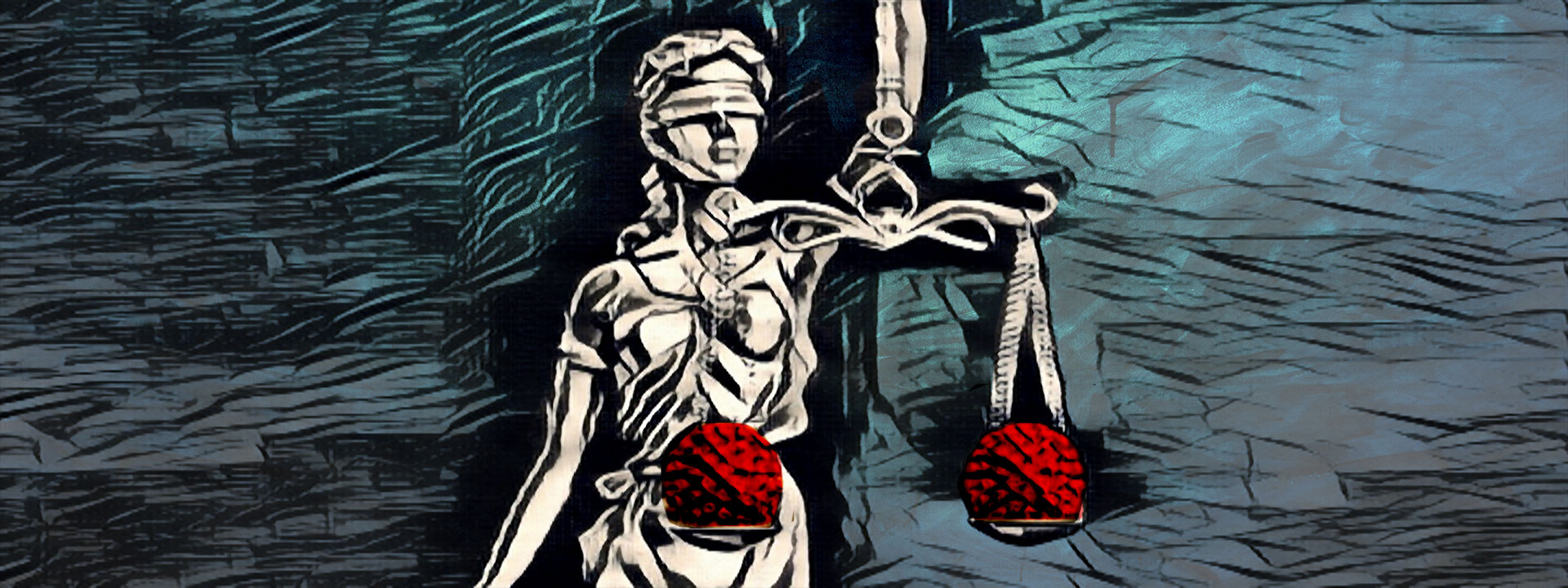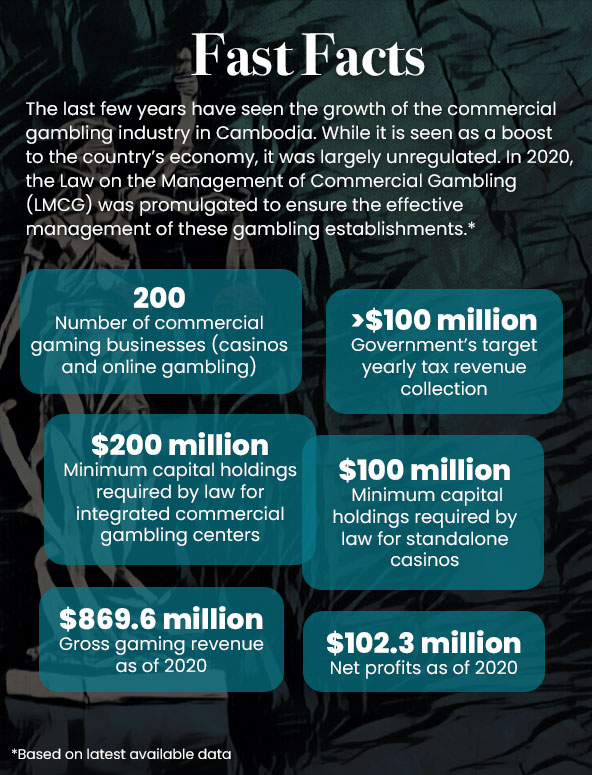Much of the world is finally beginning to open up again despite the continuing pandemic. Cambodia was among the early birds, having opened its borders late last year. And just this March, it dropped the COVID-19 test requirement for visitors from overseas in a bid to boost its tourism industry, which accounts for at least one-fourth of the country’s GDP.
But its gambling sector, which attracts thousands of foreign visitors every year, is not exactly offering favorable optics these days. In fact, Cambodia’s biggest casino has been grappling with nearly daily labor protests since December 2021.
The Cambodian authorities’ efforts to quell these protests are raising concern among rights advocates. According to rights groups, the government has been wielding its new COVID-19 law too loosely, and using it to bring protesting workers, as well as government critics, to heel.
“The COVID-19 act specifically targets groups that oppose the government and those who dare to protest against injustice,” said Khun Tharo, program manager at the Center for Alliance of Labor and Human Rights.
Human Rights Watch (HRW) Asia Deputy Director Phil Robertson meanwhile said, “It is outrageous and unacceptable that Cambodian authorities are abusing public health measures to stifle a peaceful union strike. This continued harassment against striking workers exercising their rights is a blatant attempt to silence these brave workers’ voices and weaken Cambodia’s union movement.”
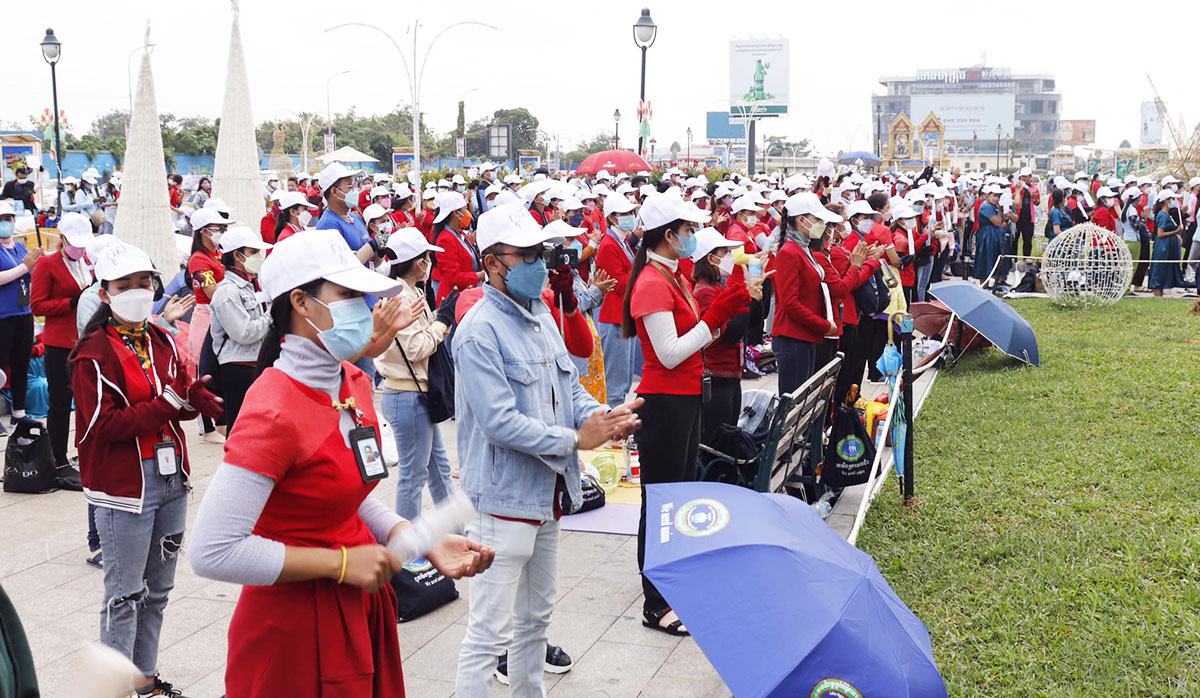
Hundreds of masked NagaWorld employees have been holding peaceful protests in the casino complex in Phnom Penh since December 2021. (Photo by the Labor Rights Supported Union)
Even UN High Commissioner for Human Rights Michelle Bachelet has taken note of how the protesters have been handled by Cambodian authorities. She said in a recent speech before the Human Rights Council: “In Cambodia, I am troubled by the authorities’ use of COVID-19 restrictions to further erode democratic and civic space, including as a pretext to break a lawful strike by casino workers. My Office witnessed recent violence by authorities, who forced women strikers onto buses and away from a strike site. In contrast to measures applied to the general public, strikers have been arbitrarily detained and forced to test multiple times for COVID-19.”
She added, “I call on the authorities to respect the right to peaceful assembly and engage in dialogue to address the strikers’ legitimate requests. Protecting fundamental freedoms will be important as the country approaches local elections, in which the country’s largest opposition party is precluded from running and many of its leaders and supporters are exiled, detained, and even facing prosecution for conduct legitimate under international law.”
Quarantine, COVID-19 tests, and arrests
Hundreds of NagaWorld employees have been holding peaceful protests either near or in front of the sprawling casino complex in Phnom Penh since Dec. 18, 2021. Among their demands are that the gaming company comply with labor rules, give proper severance pay to those who were laid off last year, and allow 365 of their colleagues who were also laid off but have been holding out to return to work. According to the workers, the lay-off was illegal and tantamount to union-busting.
Authorities have repeatedly broken up the protests and thrown strikers into quarantine centers. Some have also been arrested and detained outright, among them eight union leaders and three members. After months in detention, the leaders were released on bail last March 14, 2022. However, the three union members remain in custody.
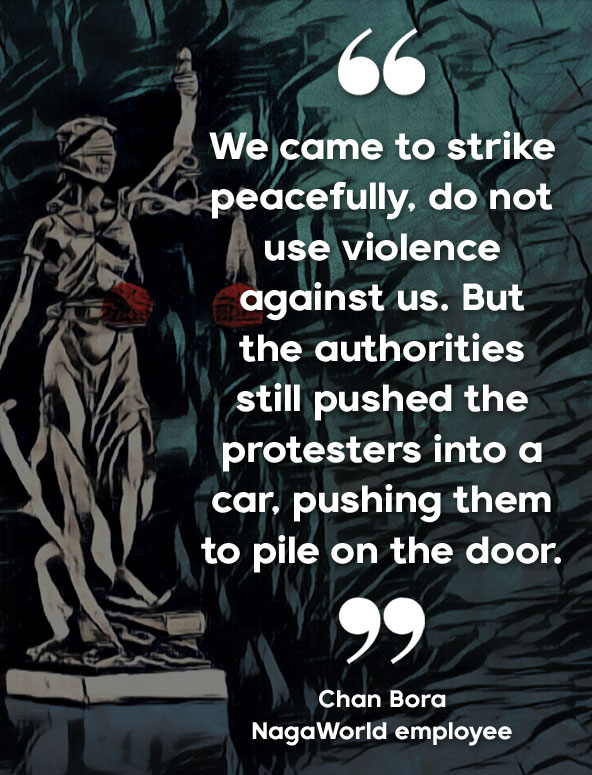
On the same day that the union leaders were released, the labor ministry recognized a new union supposedly representing NagaWorld employees. But many of the strikers say they will follow only the Labor Rights Supported Union of Khmer Employees of NagaWorld (LRSU), which is the original collective bargaining unit at the company.
On Feb. 22, 2022, the Phnom Penh City Hall issued a notification regarding the implementation of health measures, in reaction to the continued strike by LRSU members.
The notification threatened strikers with fines ranging from KHR 1 million (US$250) to KHR 5 million (US$1,250) for those deemed as disobeying COVID-19 health measures. (Before the pandemic, starting salaries at NagaWorld ranged from US$150 to US$250 a month.)
The notification also said that 64 strikers were sent to a COVID-19 quarantine center to check which workers had not yet done a second COVID-19 test. According to reports from strikers, however, many of them had already done two tests for COVID-19.
The COVID-19 law — more formally known as the Law on National Administration in the State of Emergency — was supposedly meant to curb the spread of the coronavirus disease. Signed into law in late April 2020, it carries punishments of up to 10 years in prison and a fine of as much as US$250,000 for those who breach health protocols, such as restrictions on the size of gatherings and mask wearing.
Commented HRW’s Robertson: “Many of the workers participating in the strike have diligently followed the government’s health measures by wearing masks, maintaining physical distancing, and regularly getting tested for COVID-19.”
He said that the protesters have done nothing to justify the authorities’ actions, which have included detaining them, shoving them into overcrowded buses, and then holding them against their will for further COVID-19 testing at a quarantine site that lacks appropriate sanitation and health facilities, and without adequate access to water for washing and drinking.
Former NagaWorld employee Kim Maly, who has been part of the protests, said that the Phnom Penh Municipal Police told her and 11 of her friends that they were inciting social unrest and violating health measures related to the COVID-19 law.
Protester and NagaWorld employee Chan Bora, for her part, said that on March 13, dozens of police intercepted them near Kab Ko Market while they were marching toward the casino. Tearing up, she recounted that the police pushed protesters back so hard that several of the strikers were injured, including some pregnant women.
“We told the authorities that there were strikers who were pregnant, but they did not listen,” she said. “We came to strike peacefully, do not use violence against us. But the authorities still pushed the protesters into a car, forcing them to pile on the door.”
Srey Pov, another ex-NagaWorld employee who has been among the protesters, said, “This is a dispute between NagaWorld employees and the company owners. Please do not create or paint us as anything else. We are demanding that NagaWorld desist from union discrimination. Demanding freedom of association is not a crime.”
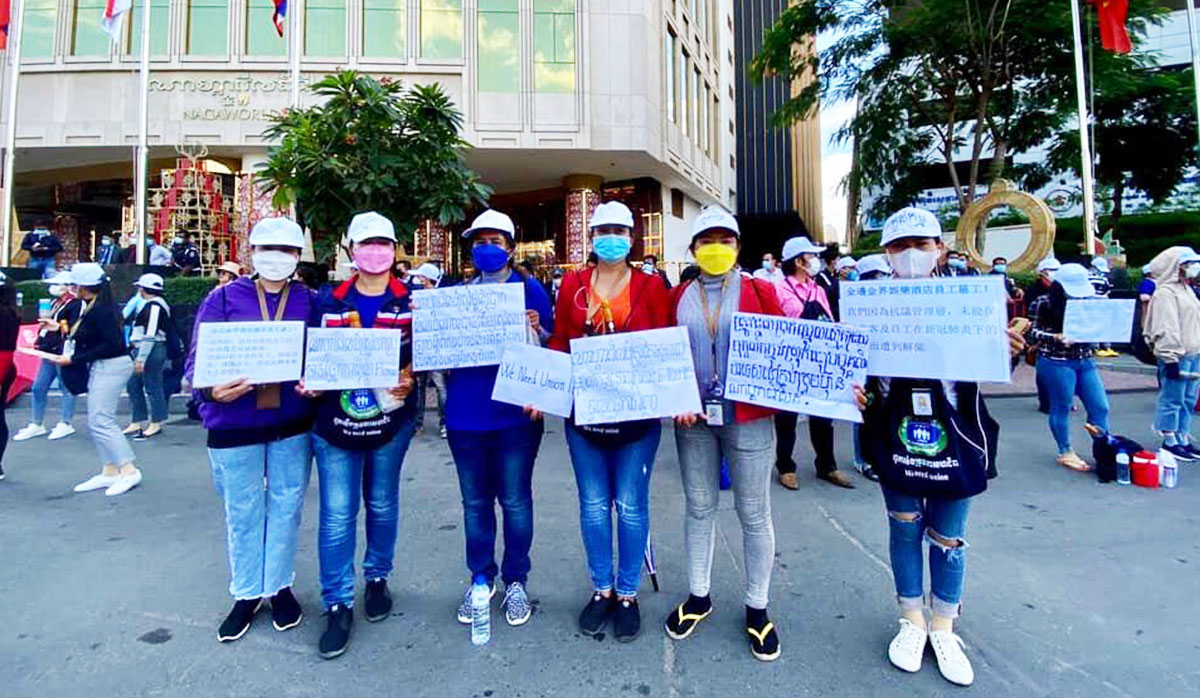
NagaWorld employees are demanding that the company comply with labor rules and give proper severance pay to workers laid off in 2021. They are also contesting what they claim as the illegal lay-off of 365 employees, which they see as tantamount to union-busting. (Photo by the Labor Rights Supported Union)
Squeezed by the pandemic?
The NagaWorld casino complex is made up of several buildings and enjoys a prime location in Phnom Penh — just where the powerful Tonlé Sap and Mekong rivers merge. Its structures cast a long shadow over the surrounding neighborhood, and on union members who regularly fill the streets in what continues to be an uphill labor battle in the “Kingdom of Wonder.”
The parent company of NagaWorld, NagaCorp., is registered in the tax haven Cayman Islands but is listed in Hong Kong. NagaCorp. was founded in 1995 by Malaysian tycoon Chen Lip Keong, who was granted Cambodian citizenship in October 2020. He has been described in the past as an “advisor” to Prime Minister Hun Sen.
In June 2021, NagaCorp. confirmed that it was laying off a substantial number of its employees because of the effect of the pandemic on its business. According to a report in Inside Asia Gaming, the company said that majority of the affected employees had “signed mutual separation agreements.” Media reports said that NagaWorld laid off more than 1,300 employees, but that the severance pay had been reduced.
Cambodian authorities had ordered casinos to close in April 2020. They were allowed to reopen only beginning Sept. 14, 2021.
Although NagaWorld managed to operate for just three months in 2020, NagaCorp. said that its Gross Gaming Revenues (GGR) for that year reached US$869.6 million, with a net profit of US$102.3 million. Its press release for its 2021 performance did not include any net profit figure. However, it did say that its GGR for 2021 had gone down to US$265.2 million.
Yet, NagaWorld has been known to pay meager sums in taxes compared to its earnings. David Van, a senior associate at the sustainable development investment firm Platform Impact in Phnom Penh was quoted in a report posted on the Cambodian Journalists Alliance Association website as saying that “the most profitable casino [NagaWorld] in the capital city, based on its full disclosure as a publicly listed entity in Hong Kong, only paid paltry taxation to the government for decades.”
NagaWorld has been mum on what impact the protests have had on its business. In the meantime, Am San Ath, deputy director at the Cambodian rights group Licadho, has remarked, “Naga World employees have been protesting because there is no suitable solution to labor disputes for them. So they try to protest but the government used health measures, using the COVID-19 law to crack down on the strikers.”
He said that when the law was passed, some civil society organizations had expressed great concern, and had asked for a review of some of its articles that may affect the rights and freedoms of citizens. According to Sam Ath, some of the passages in the law are vaguely worded and too open to interpretation. He said that could lead to misunderstandings and hurt civil liberties.
Cambodian Government Spokesperson Phay Siphan, however, said that the COVID-19 protection act is not meant to punish citizens but to prevent the spread of the virus. He said that the law has effectively done that and that all citizens must respect the law.
Due to the COVID-19 law, Siphan said, Cambodia has been successful in keeping down COVID-19 figures. The country has one of the lowest numbers of reported COVID-19 cases in Southeast Asia, totaling 135,747 as of April 3 and 3,054 recorded deaths from the disease.
Siphan said that “the critics of this law … do not yet have a deep understanding of the Cambodian. In the offices of all ministries and government units, all … staff … respect the law. This law does not apply to NagaWorld employees and human rights activists or unions only.”
According to the labor ministry, it has held talks with the strikers several times and offered “financial incentives” to those who had been laid off. The protests continue, however, as have the detention of the strikers by authorities, who send them to a quarantine center on the outskirts of the capital. ●
Hay Setha is a reporter from Cambodia.










